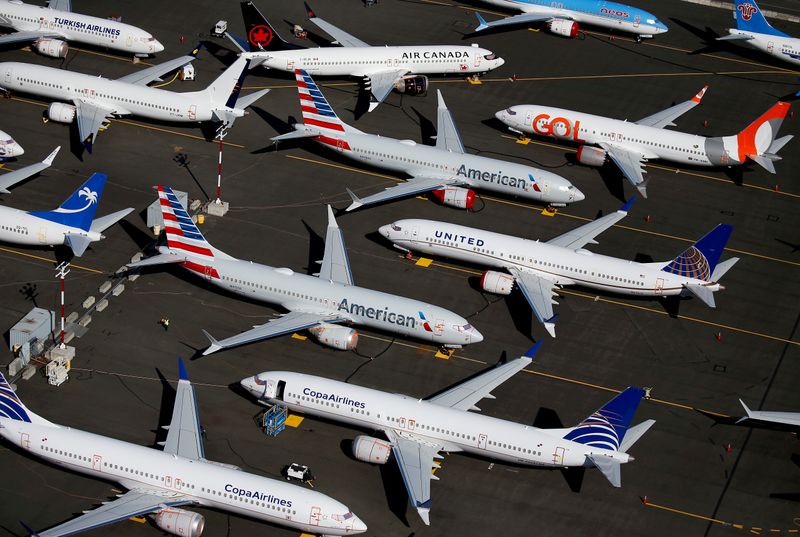By Eric M. Johnson and Tracy Rucinski
SEATTLE/CHICAGO (Reuters) - Boeing Co (N:BA) is set to win approval for its grounded 737 MAX this week, but chinks are appearing in the brand as the most traumatic chapter in the jetmaker's history overshadows the planes' original billing of superlative performance.
When it returns to the skies next month as expected after a nearly two-year safety review, the "MAX" name will still be officially in place. Some airlines, however, have begun to soft-pedal references to the aircraft following two fatal crashes that killed 346 people.
Industry sources familiar with the branding say the name will likely be phased out over time as a strategy unfolds among airlines to de-emphasize the "MAX" label in favor of the formal names assigned to each variant, like "737-7" or "737-8."
"You will see the MAX name used less frequently," one of the sources told Reuters. Another person involved in discussions over the marketing predicted the MAX name would gradually fade in coming years.
Boeing declined to comment.
The wavering support for the brand could be a setback for the company, which had unusually advertised a name as well as a model number, and urged airlines to "Think MAX." It also shows a potential sore point with airlines, who had invested promotional dollars in a name now seen as tarnished.
Brand Finance last year estimated the MAX's problems had wiped $7.5 billion off the value of Boeing's corporate image.
Anticipating this week's approval, American Airlines Group Inc (O:AAL) plans to relaunch commercial MAX flights on Dec. 29 from Miami to New York City. But while passengers will see the MAX name on booking systems, it will not appear on safety cards visible in seat pockets, people familiar with the change told Reuters.
"We changed the Boeing 737 safety cards to simplify the cards and ensure the correct card is placed on each aircraft," an American spokeswoman said, confirming the move. "This approach is consistent with other fleet types where we do not have different safety cards for sub-fleets," she added.
American has vowed to be transparent with customers about the MAX and will offer other travel options if they don't want to fly the aircraft.
Originally conceived in 2011, the word "MAX" was only ever a marketing title for the latest 737. Removing it from the cards has no impact on safety. But the cabin is where airlines define their brand, planning every visual cue, and virtually nothing there happens by chance, airline marketing experts say.
Doubts over the name surfaced in August when a news release on a MAX order from Poland's Enter Air referred to it as the "737-8."
Last week, Air Canada (TO:AC) used the same designation in a news release on quarterly earnings, with "MAX" appearing only in footnotes - a change from the year-ago format. An Air Canada spokeswoman said the airline uses the term "interchangeably."
While it is keeping the name, Boeing allows airlines to decide how they want to market the MAX. Even before the crashes, Ireland's Ryanair Holdings PLC (I:RYA) had decided to refer to its specially designed version as the "Gamechanger" rather than "MAX".
"If Boeing's customers want it dropped, it will be dropped," a third source said, adding that some key "customers are saying the name MAX is tainted."
HIGH VISIBILITY
Pressures on the once-unstoppable brand name for Boeing's fastest-selling jet highlight a delicate problem for airlines.
In the near-term, they must restore public trust in the aircraft, which calls for transparency about which plane is being used, something U.S. operators have pledged to enforce.
But the name has also drawn high-profile scepticism.
In April 2019, U.S. President Donald Trump tweeted, "I would FIX the Boeing 737 MAX, add some additional great features, & REBRAND the plane with a new name."
In January 2020, the chairman of Air Lease Corp (N:AL), an influential buyer, said the "damaged" brand should be dropped.
Changing the name of a tarnished brand has been a well-proven strategy for companies seeking to move past crises.
"Some people will remember and give you grief in the short term, but you've broken the connection," said Paul Argenti, a professor at Dartmouth's Tuck School of Business. "Someone getting on the plane four years from now won't remember 'MAX.'"
JET NICKNAMES
The MAX's branding woes are all the more tricky for Boeing, as naming civilian jets is the exception rather than the rule.
While official nicknames are common for military jets like the F/A-18 "Super Hornet," Boeing only gave its first nickname to a civilian jet with its 787 "Dreamliner" about a decade ago.
But for the MAX, it needed to pack a bigger punch in an all-out battle for market share against European rival Airbus SE (PA:AIR).
In 2011, Boeing abandoned plans for an all-new jet and launched a quicker 737 MAX upgrade after being blindsided by a huge Airbus sale to American Airlines, the company now reopening MAX flights.
Boeing marketers came up with a name that "ticked numerous boxes: max performance, max capacity, max range," said a person familiar with the discussions.
A promotional Boeing video using camera angles to give the impression of a vertical take-off - tagged "Flown by Boeing test pilots. Do not attempt" - underscored the superlative claims.

"It was short and effective," the person familiar with the discussions said of the name. "The problem," he added, "is that in a negative context it has been very effective too."